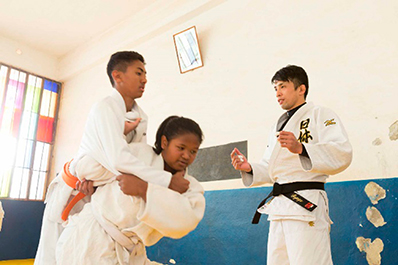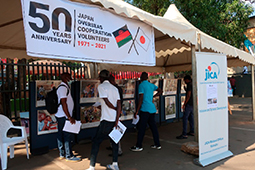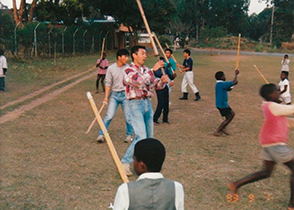(5) Culture and Sports

A JOCV teaching judo in Madagascar (Photo: KUNO Shinichi/JICA)
Cultural heritage that symbolizes a country can be effectively utilized as tourism resources to improve the livelihoods of the residents in the surrounding areas. On the other hand, a large number of cultural heritage sites are in danger due to the lack of funds, equipment, and technology among others, and assistance to protect such cultural heritages is required. In addition, the preservation and promotion of culture, such as invaluable cultural heritages in developing countries, should be addressed not only by the countries with cultural heritage in danger, but also by the entire international community.
Moreover, sports can not only help maintain and improve health, but also contribute to cultivating a sense of respect for others, a spirit of mutual understanding, and awareness of norms. The influence and positive power of sports play the role of “catalyzer” for the development and growth of developing countries.
● Japan’s Efforts
Japan has provided assistance for the promotion of culture (including sports) and higher education as well as the preservation of cultural heritage in developing countries through the Cultural Grant Assistance* since 1975. Facilities constructed with such assistance also serve as hubs for spreading information about Japan and holding cultural exchanges with Japan, and these efforts could be effective in developing a deeper understanding of Japan and fostering a sense of affinity toward Japan. In 2021, Japan implemented 14 projects to provide support in the fields of education, including Japanese language education, cultural heritage preservation, and sports under the Cultural Grant Assistance.
Moreover, Japan provides support for the restoration and preservation of cultural heritage, including equipment provision and preliminary studies and surveys, through the “Japanese Funds-in-Trust” established in UNESCO. Japan contributed approximately ¥700 million in FY2021 and has implemented multiple projects in the field of cultural heritage through the fund. Placing a particular emphasis on human resources development in developing countries, so as to enable people to preserve the cultural heritage of their own countries by themselves in the future, Japan also endeavors to dispatch international experts, mainly Japanese experts, as well as hold workshops in order to transfer the techniques and expertise to developing countries. In addition to tangible cultural heritage, Japan also supports the safeguarding of intangible cultural heritage such as traditional dances, music, handcraft techniques, and oral lore (oral traditions) by implementing successor training, records conservation, the creation of safeguard mechanisms, and other activities through the Japanese Funds-in-Trust.
Japan is also conducting training programs with the aim of improving capabilities for the protection of cultural heritage by inviting young experts involved in cultural heritage protection from the Asia-Pacific region to Japan as part of the “Project for the Promotion of Cooperation for the Protection of World Heritage and Other Cultural Properties in the Asia-Pacific Region.” In addition to conducting biennial training on maintenance and repair methods for wooden buildings and survey records of archeological remains, training on photographic documentation of heritage buildings for experts in Indonesia and other activities were conducted virtually in 2021.
Furthermore, as the host country of the Olympic and Paralympic Games Tokyo 2020, held in 2021, Japan, in order to promote “Sport for Tomorrow,” Note 60 an international contribution through sports to spread the value of sports and the Olympic and Paralympic Movement, provided sports assistance using ODA and “Projects for Sports Diplomacy Enhancement.” Note 61 In addition, 23 JOCVs have been dispatched in the field of sports (see “Peace and Stability” regarding Japan’s initiatives in South Sudan, and “Project Introduction Column” regarding JOCV’s activities).
Malawi
The 50th Anniversary of JOCV Program in Malawi – Kendo Suburi (practice swings) Made the Japan-Malawi Bond
JICA Volunteer Program (1971 – ongoing)
50 years have passed in August 2021 since Japan Overseas Cooperation Volunteers (JOCVs)*1 were dispatched to Malawi in southeast Africa for the first time. The total number of JOCVs dispatched to Malawi is 1,897 (as of the end of October 2021). The country is the world’s largest recipient of JOCVs. They have worked with local people to address issues they face and have contributed to the development of Malawi across a range of fields. They have not only carried out activities relating to their work roles at their assigned locations, but also have engaged in a wide variety of cooperative activities and exchanges while living with local people, speaking their language, and becoming part of their local communities.
A JOCV nutritionist dispatched to a hospital in Blantyre, a business city in southern Malawi, was practicing kendo swings in the hospital garden during break time in 1992. This attracted some children nearby and they ended up joining in the practice. After the JOCV returned to Japan, other dispatched volunteers also continued to practice kendo with those children and they ended up becoming kendo instructors.
JOCV kendo instructors have not been to Malawi, and a sufficient number of protective gear and adequate facilities have not been arranged. Nevertheless, kendo became widespread in the country as JOCVs dispatched to work in various fields continued practicing kendo with the people of Malawi as part of their daily lives in the community. As a result, the KENDO Association of Malawi was established in 1999, and kendo- and culture-related exchanges through JOCVs have continued ever since. It will be 30 years in 2022 since kendo (practice swings in the hospital garden) was introduced in Malawi.
JOCV’s activities in the local communities have led to the enhancement of friendship and mutual understanding between Malawi and Japan and are highly appreciated as Japan’s “Visible Development Cooperation.”

A photo exhibition in commemoration of the 50th anniversary of the JOCV Program in Malawi, organized at a shopping mall in the capital city of Malawi (Photo: JICA)

JOCVs teaching kendo to children in around 1993 (Photo: JICA)
*1 In Japanese, JICA kaigai kyoryoku tai; at the time, the Japanese term used was seinen kaigai kyoryoku tai.
Glossary
- Cultural Grant Assistance
- Cultural Grant Assistance is a grant aid to procure equipment and supplies and to construct and rehabilitate facilities for the promotion of culture (including sports) and higher education as well as preservation of cultural heritage in developing countries. It is intended to encourage cultural and educational advancements in developing countries as well as cultural exchanges between Japan and these countries with an aim of promoting friendly relationships and mutual understanding. It includes Cultural Grant Assistance, which provides assistance to governmental organizations of developing countries, and Grant Assistance for Cultural Grassroots Projects, which provides assistance to NGOs and local public entities for small-scale projects.
- Note 60: Sport for Tomorrow Consortium (https://www.sport4tomorrow.jpnsport.go.jp/)
- Note 61: MOFA’s efforts regarding the Tokyo 2020 Olympic and Paralympic Games (https://www.mofa.go.jp/p_pd/ep/page23e_000467.html)
